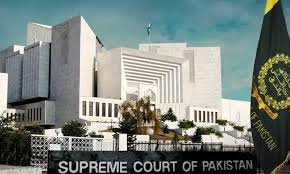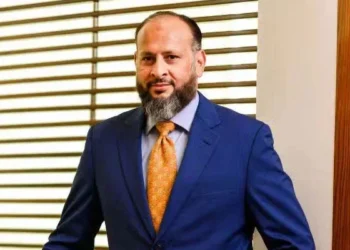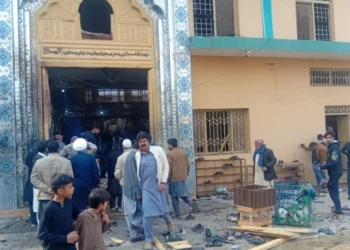Justice Naeem Akhtar Afghan spoke to lawyer Salman Akram Raja during a hearing on an intra -court appeal against the decision of the civilian trial in the military courts in the Supreme Court. With the Army Act legislation.
A seven -member constitutional bench, headed by Justice Aminuddin Khan in the Supreme Court, heard an intra -court appeal against the military trial of civilians in the military courts, during which the convicted accused Erzam Junaid’s lawyer Salman Akram Raja argued.
At the hearing, Salman Akram Raja argued that there are 2 issues in the case, one is a problem of Article 175, as far as basic rights are concerned, the doors will not be closed.
Justice Jamal Mandokhel asked if the rights were not available and would be affected by any act, would the rights be affected? If a person of the Armed Forces commits a crime at home, will the Army Act take place?
Justice Jamal Mandokhel said that if a soldier has a domestic problem, if the second wife is married without the will of the first wife, will the second marriage be sent to the military court?
Salman Akram Raja replied that the Army Act is a black hole. If any amendment is made, the basic rights will be abolished. According to the law, the crime must be related to the Army Act.
Salman Akram said that for example, it is forbidden to blow a kite in Punjab. If a military person in Punjab flies a kite in the house, there will be no military trial but it will also apply civilian law.
Justice Naeem Akhtar, while talking to Salman Akram Raja, said that he would not accept badly, an amendment was made in the Army Act during your political party, your political party had warmly made the Army Act in Parliament. On this, Salman Akram Raja said, “I was not part of PTI at that time, I have always been in opposition.”
Salman Akram Raja argued that for the first time in the FB Ali case in 1975, two -to -one were mentioned. Judicial reviews can be made, Article Eight 3 is not available for one -to -one.
Justice Naeem Akhtar remarked that the ordinance was brought in 1967 for the two -to -one, which has a term, is it obsolete when the ordinance expires? Salman Akram Raja replied that the Official Secret Act has been present since 1923 and under the Official Secret Act, the trials have been underway before 1967.
Justice Mandokhel said that if a person commits such a crime in the civil service, he is expelled from the job, there is no authority to punish the civil service, the Armed Forces gets a job on one side and on the other hand, you are punished. You have to tell who is the Army Act applicable?
Justice Muhammad Ali Mazhar questioned that if a spy is caught, where will he do his trial? Justice Hassan Azhar asked if a civilian enemy gives the secret to the country, where will his trial be? Salman Akram replied that the trial official is under the Official Secret Act, which has a procedure.
Salman Akram Raja said, “I will not speak against the constitution, I will not break the arguments, in the world, it does not happen that the Constitution should give basic rights and take any finger. It cannot be that the commanding officer says I want the accused, Give it to me.
Justice Mohammad Ali Mazhar said that a five -member bench has abolished Section Two, after the expiry of the section two, the spy elements cannot have a military trial, there are civil servants in the Army, if the enemy under the guise of the employee is spying for the country. So where will the trial be? On this, Salman Akram said that the civil servants in the Army are subject to the Army Act.





















